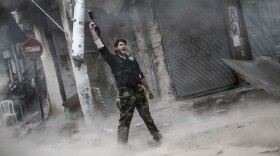Facebook is the bulletin board for the Syrian revolt.
When a newly formed opposition group, the , got it was a sign that support is building for a group formed Sunday after a week of negotiations in Doha, Qatar.
The this week, becoming the first European government to formally recognize the coalition as "the sole representative of the Syrian people and, therefore, as the future provisional government of democratic Syria."
The six-nation Gulf Cooperation Council, which includes Saudi Arabia, has also granted recognition.
And Turkey, a key player and Syria's neighbor to the north, followed suit on Thursday.
However, aside from France, Western powers, including the Obama administration, are hesitant and seem to be waiting to see if the coalition garners support inside Syria.
And one key way by which that support will be measured is Facebook.
The new leader of the Syrian opposition coalition, a charismatic preacher from Damascus, , made his first appeal to the Syrian people on his Facebook page, focusing on internal recognition. He explained that unity is a key for international support.
"Syria is a dangerous area in the world," he wrote. The West "won't lift the regime's political cover without ascertaining [whether] we can manage our country. Likewise, they won't offer relief or military assistance in the absence of a cohesive body managing the country."
Khatib wants to show that this newly formed body can "manage" Syria, but how to demonstrate support inside Syria?
Another form of communication over the 20-month revolt is the name given to the Friday demonstrations. Every protest group adopts the same slogan in a voting process over the Internet. So, Khatib urged activists to send a strong message.
"I want the coming Friday's slogans to be thus: 'Obama, don't worry — we stand by the coalition,' " he wrote. "I want streamers thanking the French president and placards saying, 'The Syrian people are one' and 'No extremism and no terror.' You need not use the same words, but their meaning."
The coalition has to also win over the military councils fighting President Bashar Assad's regime. Western powers fear the growing role of Islamist radicals among the rebel ranks, including some with links to al-Qaida. Some of these groups are funded and armed through private donors that share radical ideologies.
The signals of support from military commanders are slow in coming, say analysts who monitor rebel Facebook pages, but it is still too early to assess the reaction.
The Syrian National Coalition was created under U.S. pressure as an alternative to the Syrian National Council, a body that was widely seen as dysfunctional, beset by personal rivalries and mostly representing Syria's Muslim Brotherhood.
In the past week, Syrian opposition politics has gotten even more complex. The new body represents more secular dissidents but is headed by an imam, or Muslim cleric.
The old Syrian National Council, while still mostly controlled by the Muslim Brotherhood, elected a Christian dissident to lead the group. The irony is not lost on Syrians who joke about all this on Facebook.
Copyright 2020 NPR. To see more, visit https://www.npr.org. 9(MDAxNDQ2NDAxMDEyNzU2NzM2ODA3ZGI1ZA001))







